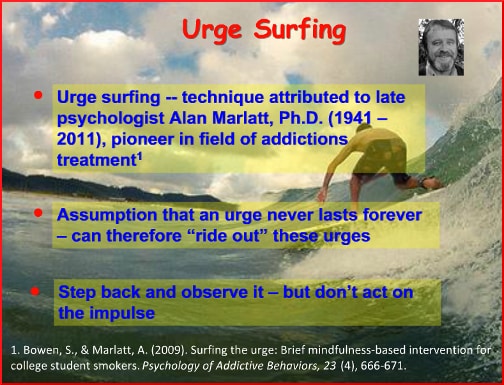
In Dr. Pretlow’s presentation at the World Congress of Psychiatry, he mentioned the work of Alan Marlatt, Ph.D., who did pioneering work in the field of addiction treatment. Dr. Marlatt founded the Addictive Behaviors Research Center, created Mindfulness-Based Relapse Prevention, or MBRP, and wrote Relapse Prevention: Maintenance Strategies in the Treatment of Addictive Behaviors.
In 2008, he collaborated with Brian D. Ostafin on “Surfing the Urge: Experiential Acceptance Moderates the Relation Between Automatic Alcohol Motivation and Hazardous Drinking.” In 2009, he also collaborated with Sarah Bowen on “Surfing the urge: brief mindfulness-based intervention for college student smokers.”
One thing that Dr. Pretlow emphasizes again and again is that young people are fed up with nutrition information. What they cry out for is a way to cope with the desire to overeat. They need a repertoire of skills, a set of wrenches in the toolbox.
Here is something that appears to fill that need. In an interview conducted by Kevin Griffin for InquiringMind.com, Dr. Marlatt said:
Relapse prevention is a cognitive behavioral approach that mainly teaches people skills: how to cope with triggers and high-risk situations, how to manage urges and cravings. It also helps people get a better sense of their own personal journeys and the forks in the road that lead either to recovery or to falling off the wagon. In getting this bigger picture, mindfulness meditation enhances what many people call “meta-cognition” — the ability to stand back, observe what is happening and think about what you are doing rather than being on automatic pilot.
This goes back to ancient teachings, and Dr. Marlatt explains the Buddhist view of urges and cravings, which is that they can’t be gotten rid of. Acceptance of that undeniable fact is the basis for all that follows.
He quotes a woman who participated in one of his programs, who pointed out that the words “dictator” and “addiction” have the same root, and both are telling us to do something. But no one needs to let their thoughts perform the function of a dictator.
Dr. Marlatt’s practice concentrated on the long haul. Most of the clients he dealt with had already been through a 12-step program or an inpatient “drying-out” regimen. His mission was to provide the coping mechanisms for the succeeding years and decades of life that recovering addicts will hopefully experience.
Many people who are dealing with or have dealt with addiction, have more than one adverse situation going on. For instance, a person might be anxiety-ridden. Part of the work is to disconnect the anxiety from the addiction, to reduce its triggering power. Another part is to diminish the anxiety itself, a healing which meditation is ideally sited to facilitate.
The Portland Psychotherapy Clinic has published complete instructions for urge surfing.
IT’S NEVER TOO LATE TO REBOOT HALLOWEEN
Even if this year’s Halloween festivities are pretty much set in stone, and even if you already have a sinking feeling that it’s going to be a disaster of one sort or another, take heart from this list of ideas to start planning for next year.
“Halloween Advance Strategy”
“Halloween Roundup”
“Halloween Roundup, Continued”
“Remodeling Halloween”
“How to Make Halloween Memories”
Your responses and feedback are welcome!
Source: “Surfing the Urge,” InquiringMind.com, October 2009
Source: “Riding the Wave: Using Mindfulness to Help Cope with Urges,” PortlandPsychotherapyClinic.com, undated
Image source: Weigh2Rock

 FAQs and Media Requests:
FAQs and Media Requests: 











